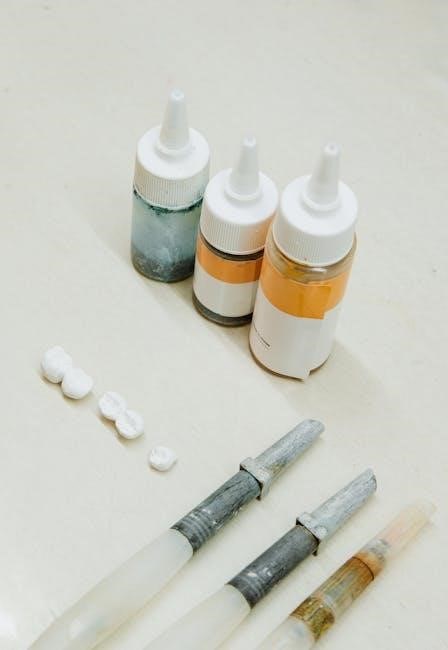
Proper post-operative care is crucial for dental implant success. These instructions guide patients through recovery, ensuring optimal healing and minimizing complications. Follow them closely for the best results.
1.1 Importance of Following Post-Operative Care

Adhering to post-operative care is vital for the success of dental implants. Proper care ensures the implant integrates with the bone, reducing the risk of complications. Avoiding smoking and alcohol, using recommended mouthwashes, and following dietary advice are crucial. Neglecting these steps can lead to complications or implant failure. By prioritizing post-operative care, patients promote healing and achieve long-term success with their dental implants.
1.2 Overview of the Healing Process
The healing process after dental implant surgery typically lasts several months. Initial recovery involves swelling and discomfort, managed with painkillers and ice. The implant integrates with bone over 3-6 months. A soft diet is recommended for 2-4 weeks to protect the site. Proper oral hygiene, including mouthwash use, is essential. Smoking and alcohol should be avoided to prevent complications. Patients must follow all post-op instructions to ensure proper healing and a successful outcome.
Pain Management After Dental Implant Surgery
Over-the-counter pain relievers like ibuprofen or acetaminophen are typically recommended to manage discomfort. Always follow your dentist’s advice for safe and effective pain management.
2.1 Managing Discomfort and Pain
Pain typically peaks 48-72 hours after surgery, with minor discomfort lasting up to two weeks. Use ice packs to reduce swelling and follow your dentist’s advice for pain relief. Keep the surgical area clean and avoid irritants to promote healing. Stay hydrated and rest to aid recovery. Monitor pain levels and adjust care as needed, ensuring a smooth and comfortable healing process for your dental implants.
2.2 Recommended Pain Relief Medications
Over-the-counter pain relievers like ibuprofen or acetaminophen are effective for managing discomfort. For severe pain, your dentist may prescribe stronger medications like vicodin. Always follow the recommended dosage and consult your dentist if pain persists or worsens. Avoid alcohol and smoking, as they can hinder healing and increase pain. Proper medication use ensures a comfortable recovery and supports the healing process for your dental implants.
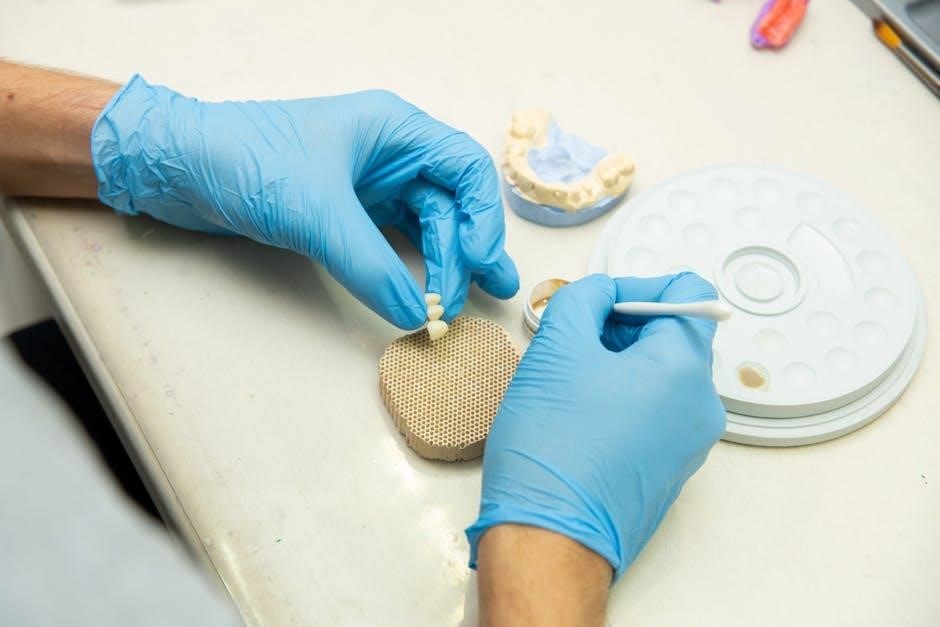
2.3 Duration of Pain and Discomfort
Pain typically peaks 48-72 hours after surgery and subsides gradually. Mild discomfort may persist for a few days, with some patients experiencing sensitivity around the ear for 1-2 weeks. Over-the-counter painkillers can help manage symptoms. If pain worsens or lasts longer than expected, contact your dentist. Proper care and medication can minimize discomfort, ensuring a smoother recovery process for dental implant patients.

Oral Hygiene and Care
Proper oral hygiene is vital for healing. Avoid disturbing the surgical site, use antibacterial mouthwash, and maintain gentle cleaning to prevent infection and promote recovery.
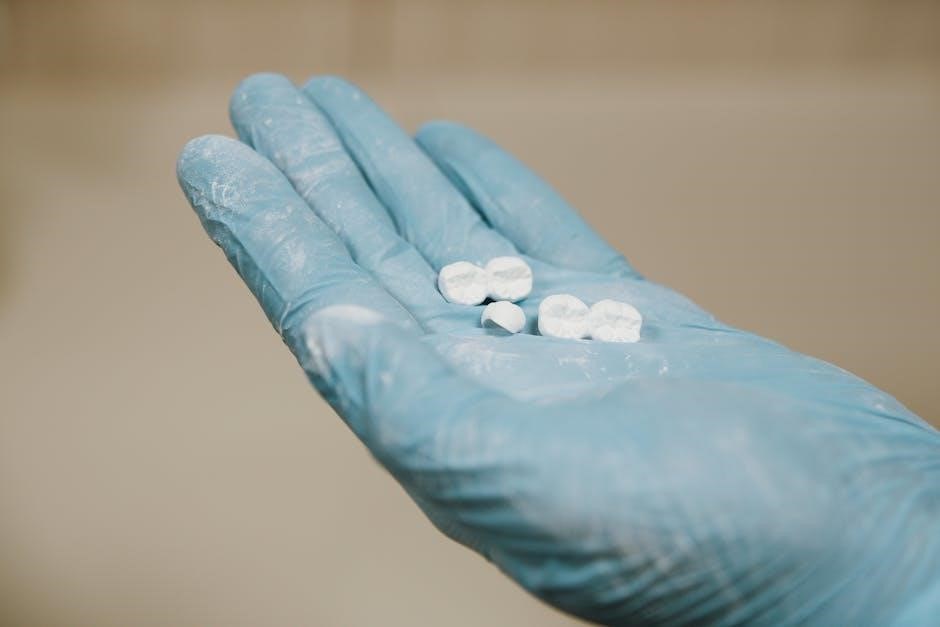
3.1 Rinsing and Cleaning the Surgical Site
Avoid rinsing or spitting for 24 hours post-surgery to protect the blood clot. After 24 hours, rinse gently with warm salt water (1/2 teaspoon salt in 8 ounces of water) 2-3 times daily. Use Corsodyl mouthwash twice a day, as directed, to reduce bacteria and promote healing. Keep the surgical area clean to prevent infection and ensure proper recovery.
Avoid using a straw or vigorous swishing, as this can dislodge the clot. Continue rinsing for two weeks or as advised by your dentist.
3.2 Use of Mouthwash and Antibacterial Rinse
Starting the day after surgery, use Corsodyl mouthrinse twice daily, after breakfast and before bed. Rinse for at least 30 seconds, then spit it out. Antibacterial rinses help reduce bacteria, promoting healing and preventing infection. Do not use mouthwash during the first 24 hours or replace saltwater rinses with it. Continue this regimen for two weeks or as directed by your dentist.
Regular use of antibacterial rinse supports a clean surgical site and aids in proper recovery.
3.3 Avoiding Smoking and Alcohol
Smoking and alcohol can significantly hinder the healing process after dental implant surgery. Avoid smoking for at least 10 days and refrain from consuming alcohol for 48 hours. Both can disrupt the formation of a healthy blood clot, increasing the risk of complications and infection. Adhering to these guidelines ensures proper healing and minimizes the chance of post-operative issues; Your dentist may extend these restrictions based on individual recovery progress.
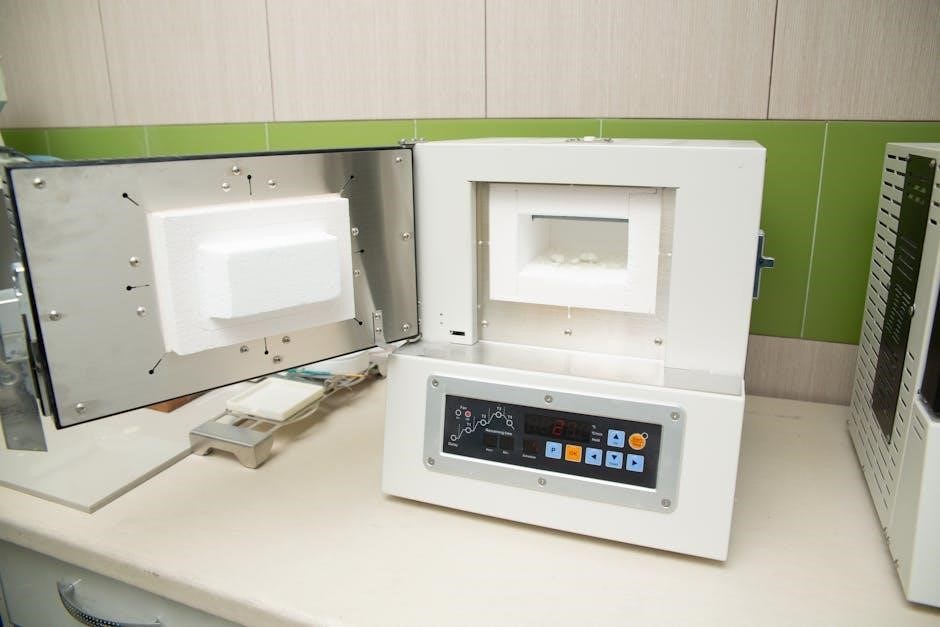
Dietary Recommendations
A soft, mild, and nutritionally balanced diet is essential after dental implant surgery. Avoid hard or crunchy foods to prevent discomfort and support healing for at least 24 days;
4.1 Soft Food Diet and Nutritional Balance
A soft food diet is essential after dental implant surgery to minimize discomfort and support healing. Opt for nutrient-rich foods like soups, scrambled eggs, and yogurt. Avoid hard or crunchy items that could disrupt the surgical site. A balanced diet ensures proper recovery while maintaining overall health. Stick to soft foods for at least 24 days or as advised by your dentist to promote optimal healing and prevent complications.
4.2 Avoiding Hard or Crunchy Foods
Avoiding hard or crunchy foods is vital after dental implant surgery to prevent dislodging the implant or causing discomfort. Foods like nuts, chips, and raw vegetables should be avoided during the initial healing phase. These items can apply excessive pressure on the surgical site, potentially disrupting the implant’s stability. Opting for softer alternatives ensures a smoother recovery and protects the implant from damage. This precaution is typically necessary for several weeks, as advised by your dentist.
4.3 Duration of Dietary Restrictions
Dietary restrictions after dental implant surgery typically last 24 days but may extend longer if necessary. The duration depends on the healing progress and implant type. Patients should avoid hard or crunchy foods during this period to ensure proper healing. A soft, nutritionally balanced diet is recommended to maintain health without compromising recovery. Gradually introducing normal foods should only be done under the dentist’s guidance, ensuring the implant has stabilized and the site is fully healed.
Monitoring the Healing Process
Monitor swelling, bruising, and pain levels post-surgery. Keep an eye out for unusual symptoms that may indicate complications. Proper observation ensures a smooth recovery process.
5.1 Swelling and Bruising After Surgery
Swelling and bruising around the surgical site are common post-implant symptoms. They typically peak within 48-72 hours and subside gradually. Apply ice packs to reduce swelling. Bruising may extend to the face or neck. Gentle care and adherence to post-op instructions help minimize these effects, ensuring a smoother recovery. Monitor for unusual discoloration or prolonged swelling, which may warrant medical attention.
5.2 Signs of Complications to Watch For
Monitor for severe pain, heavy bleeding, fever, or increasing swelling, as these may indicate infection or complications. Watch for redness, pus, or implant mobility, which could signal improper healing. Persistent numbness, tingling, or difficulty opening the mouth may also arise. If any unusual symptoms persist or worsen, contact your dentist immediately. Early detection of complications is key to preventing implant failure and ensuring a successful recovery.
5.3 When to Contact Your Dentist
Contact your dentist immediately if you experience severe pain, heavy bleeding, fever, or worsening swelling or bruising. If bleeding doesn’t stop after 24 hours, or if you notice pus, redness, or implant mobility, seek help. Persistent numbness, tingling, or difficulty opening your mouth are also concerning signs. Early intervention is crucial to address potential complications and ensure proper healing. Don’t hesitate to reach out if you have any unusual symptoms or concerns about your recovery.

Follow-Up Appointments
Regular follow-up appointments are essential to monitor healing progress and ensure proper implant integration. Schedule visits as recommended by your dentist to maintain optimal results and address concerns.
6.1 Importance of Regular Check-Ups
Regular check-ups are vital to ensure proper healing and implant integration. These visits allow your dentist to monitor progress, address concerns, and prevent potential complications. Regular check-ups also enable early detection of any issues, ensuring long-term success and stability of the implant. By attending follow-ups, you can receive personalized advice and adjustments, promoting optimal recovery and maintaining your oral health. Consistent monitoring helps in achieving the best possible outcomes for your dental implants.
6.2 Scheduling and Frequency of Visits
Follow-up appointments are typically scheduled within a few days of surgery, then monthly for the first few months. Your dentist may recommend visits at specific intervals to monitor healing and ensure proper implant integration. Regular check-ups may continue annually to assess long-term stability and functionality. Consistent scheduling ensures any potential issues are addressed early, promoting a smooth recovery and lasting success of your dental implants.
Home Care Instructions
Proper home care is essential for healing. Keep the surgical site clean, avoid irritants, and follow your dentist’s specific instructions to ensure a smooth recovery process.
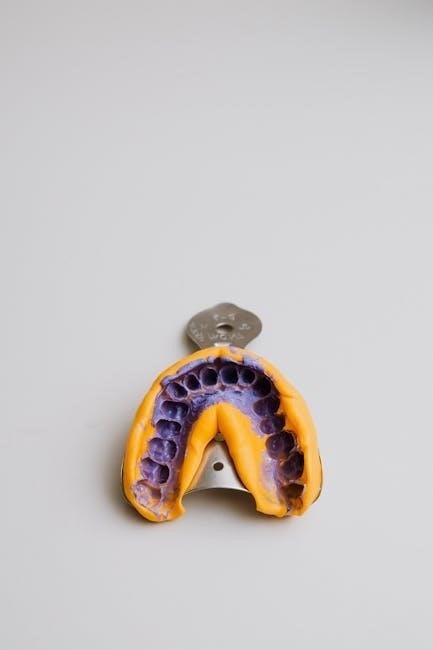
7.1 General Tips for Recovery
Rest is crucial after implant surgery. Avoid strenuous activities for 24-48 hours. Use ice packs to reduce swelling, and keep your head elevated while resting. Gently clean the area with a soft toothbrush and mild toothpaste, avoiding direct contact with the implant site. Stick to a soft, balanced diet to promote healing and prevent discomfort. Follow your dentist’s advice closely to ensure a smooth and effective recovery process.
7.2 Avoiding Irritants and Trauma to the Site
Avoid smoking for at least 10 days and refrain from alcohol for 48 hours post-surgery. Do not use straws, as the pressure can dislodge the blood clot. Keep your fingers and tongue away from the surgical area to prevent irritation. Avoid chewing on hard or sharp objects near the implant site. Protect the area from accidental bumps or trauma, as this can disrupt healing. Maintaining a clean environment around the implant is essential for proper recovery and to prevent complications.
Following post-op instructions for dental implants is vital for a smooth recovery and long-term success. Proper care, including avoiding irritants and adhering to dietary guidelines, ensures optimal healing. By avoiding smoking, hard foods, and maintaining good oral hygiene, patients can minimize complications. Regular check-ups and following your dentist’s advice are essential for the implant’s success. Remember, patience and adherence to instructions will lead to a rewarding outcome with durable, natural-looking implants. Always consult your dentist for personalized guidance and support.